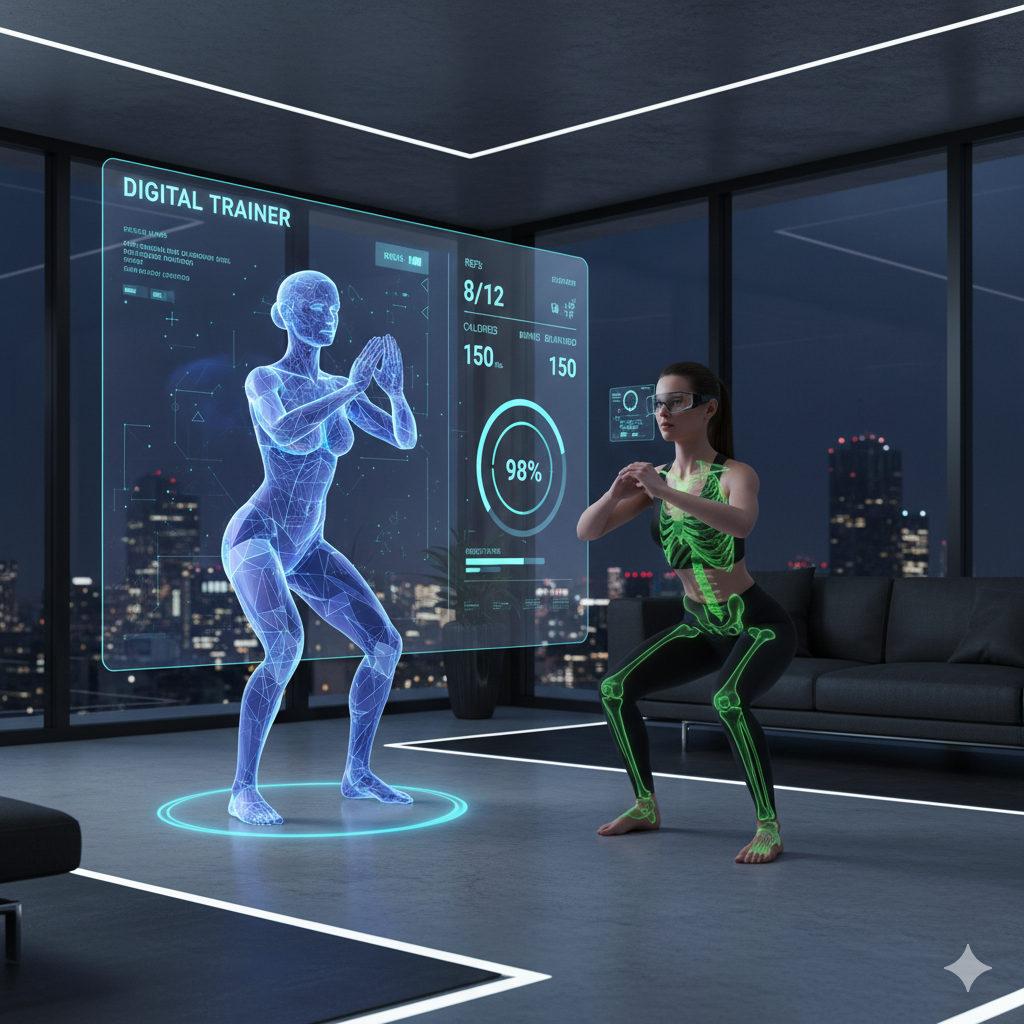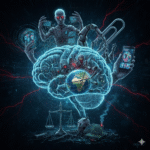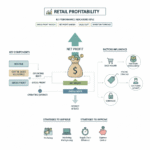The world of fitness is saturated. We’ve gone from VHS workout tapes to generic fitness apps that offer vast libraries of pre-recorded classes. Yet, for all this content, true personalization has been the exclusive domain of expensive, in-person personal trainers. If you want a program that adapts to your sleep, your stress, your diet, and your daily performance, you have to pay a premium.
A new revolution is underway, moving far beyond simple step counting and calorie logging. Artificial Intelligence (AI) is stepping into the role of a personal coach, creating a “digital trainer” that is data-driven, hyper-personalized, and accessible 24/7. This isn’t just a smarter app; it’s a fundamental shift in how we approach our health.
This article explores the technology behind AI-powered personal fitness coaching, the tangible benefits it offers, its critical limitations, and the hybrid future it promises.
🏋️ Beyond the App: What Is True AI Fitness Coaching?
When most people think of a “fitness app,” they think of a digital logbook or a video library. A traditional app might give you a static, 6-week “Get Abs” plan, and it’s up to you to follow it.
AI-powered coaching is fundamentally different. It is a dynamic system that learns and adapts to you in real-time.
An AI coach doesn’t just give you a plan; it creates and modifies the plan based on a constant stream of data. This data can include:
-
Performance Data: How many reps did you actually complete? How much weight did you lift? How quickly did you finish your run?
-
Biometric Data: What was your heart rate variability (HRV) this morning? How many hours of REM sleep did you get? (Pulled from your wearable).
-
User-Reported Data: How did that workout feel (Rate of Perceived Exertion)? Are you sore? What did you eat?
-
Form Data: Are your knees caving in on your squat? Is your back rounding on your deadlift? (Analyzed via your phone’s camera).
The AI system synthesizes this information to make intelligent decisions, just as a human coach would. It moves beyond “one-size-fits-all” and delivers true “one-size-fits-one” hyper-personalization.
🧠 The “Brain” and “Eyes” of Your Digital Coach
What separates an AI coach from a simple algorithm is its ability to “see,” “think,” and “communicate.” This is made possible by a few key technologies working in unison.
The “Eyes”: Computer Vision as Your Form-Checker
This is perhaps the biggest game-changer. Using your smartphone’s camera, AI models use pose estimation to map your body’s key joints in real time.
Imagine you’re doing a squat. The AI can see your skeletal position and instantly provide feedback like, “Drop your hips lower” or “Keep your chest up.” This technology effectively democratizes elite-level form correction. It’s no longer something you can only get from a one-on-one coach. By analyzing your every rep, the AI helps maximize effectiveness and, most importantly, prevent the injuries that often detail progress.
The “Brain”: Machine Learning for Hyper-Personalization
This is the “thinking” part of the coach. Machine learning (ML) algorithms are the engine of adaptation.
-
Example 1: Progressive Overload. The ML algorithm sees you completed all 3 sets of 10 reps on your bench press. Instead of you having to guess what to do next week, the AI automatically increases the weight or reps in your next scheduled workout to ensure you keep making progress.
-
Example 2: Holistic Recovery. The AI notices (via your wearable) that your sleep score is poor and your resting heart rate is high. It concludes you are under-recovered. Instead of pushing you through a high-intensity session, it automatically swaps that day’s workout for a lighter, recovery-focused session of mobility and light cardio.
The “Voice”: NLP for Motivation and Guidance
Modern AI coaches incorporate Natural Language Processing (NLP) to create conversational chatbots. This “voice” of the AI serves as your motivator and guide. You can ask it, “What’s a good substitute for a dumbbell row?” or “I’m feeling unmotivated,” and it can provide an intelligent answer or a piece of encouragement, mimicking the supportive relationship of a human coach.
✅ The Tangible Benefits (Why It’s a Game-Changer)
The shift to AI coaching isn’t just a gimmick; it provides tangible solutions to the fitness industry’s biggest problems.
-
Unmatched Affordability: The most obvious benefit. A high-quality human personal trainer can cost $70-$150 per session. An AI-powered coaching app typically costs $20-$40 per month. This democratizes access to personalized guidance for millions.
-
24/7 Accessibility: Your AI coach is always in your pocket. You don’t need to schedule appointments. Whether you work out at 5 AM or 11 PM, your personalized plan and form-correction feedback are ready when you are.
-
Data-Driven Objectivity: An AI coach is unbiased. It bases its decisions purely on your data, removing the guesswork (and sometimes the emotional bias) from your training. You can visually track your strength gains, your recovery improvements, and your consistency over time.
-
Holistic Health Integration: AI excels at connecting disparate data points. It’s the first tool that can practically link your workout performance, your sleep quality, your nutrition, and your stress levels into one single, cohesive, and adaptive health plan.
⚠️ The “Ghost in the Machine”: Where AI Falls Short
For all its benefits, AI is not a perfect replacement for a human coach. Relying on it exclusively can have a dark side, a crucial point many trainers are now raising.
A Note on the “Dark Side” of AI Fitness Recent reports from fitness professionals highlight a troubling trend. Some clients become so obsessed with “beating” the app’s metrics that they develop unhealthy behaviors. They may overtrain, skip meals to hit a calorie goal, or feel intense anxiety after missing a single day of tracking.
Here are the key limitations:
-
The Missing Human Element: AI lacks empathy. It cannot understand the why behind your data. It doesn’t know you had a terrible day at work, and what you really need is not an optimized workout but a supportive conversation. Accountability to an app is also far weaker than accountability to a person you respect.
-
Loss of Bodily Intuition: When you rely solely on data, you can stop “listening to your body.” The app might say you’re “100% recovered,” but you feel nagging pain in your knee. An over-reliant user might push through the pain and cause an injury, whereas a human coach would see you wince and immediately stop the exercise.
-
Bad AI Advice: An AI is only as good as its data and algorithms. Some “AI” apps are little more than “cookie-cutter” programs wrapped in good marketing. Trainers report having to “re-educate” clients who were given unsafe or unrealistic plans by a poor-quality AI.
🤝 The Future: The Rise of the “Hybrid Coach”
The future of personal fitness is likely not “AI vs. Human.” It’s “AI + Human.”
We are entering the era of the hybrid coach. In this model, the AI does the heavy lifting on data analysis, while the human coach provides the essential elements of empathy, strategy, and accountability.
-
For the Client: You get the best of both worlds. Your AI app handles your daily workout programming, 24/7 form correction, and nutrition tracking. Then, you have a weekly check-in with your human coach, who reviews your AI-generated data, discusses your mental state, and makes high-level strategic adjustments to your plan.
-
For the Trainer: AI becomes a powerful assistant. It automates the time-consuming tasks of data-crunching and program-building. This frees the trainer to do what they do best: focus on the human relationship, provide motivation, and manage the client’s long-term journey.
We will also see AI integrated more deeply into our environment, with smart mirrors, VR/AR workouts, and even smart clothing or footwear that can analyze your gait to predict injury risk before it happens.
In conclusion, AI-powered personal coaching is far more than a trend. It is a powerful tool that is making high-level, personalized fitness guidance more accessible and effective than ever before. But like any tool, it must be used wisely. It cannot replace the intuition, empathy, and connection of a great human coach.
The smartest path forward is a balanced one—using AI to understand our data, but never letting it silence the wisdom of our own bodies.


